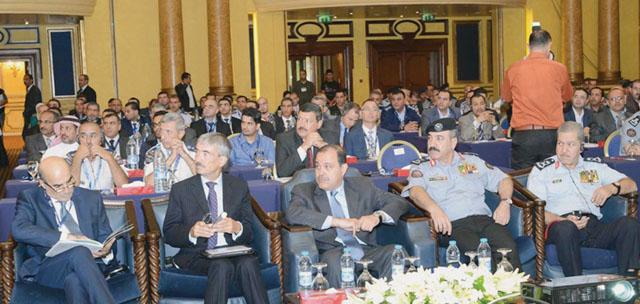You are here
World should work to combat takfiri ideologies — Majali
By Rana Husseini - Sep 29,2014 - Last updated at Sep 29,2014

AMMAN — Efforts should be exerted to combat the looming danger of “takfiri terrorist ideologies” that represent a direct threat to Jordanian society and other societies of the world, Interior Minister Hussein Majali said on Monday.
“Such dangerous thoughts are not related to Islam or any other religion, and we should address them by identifying the incubating environment and the reasons behind it to prevent its spread,” Majali said at the opening of the third “Middle East Homeland Security Summit”.
The two-day summit was organised by Fleming Gulf and officially hosted by the Gendarmerie Forces.
Majali urged the gathering to focus on addressing social media websites “since extremist groups use these websites to target and recruit young fighters all over the world, and also use these means to spread their extremist and wrongful thoughts and beliefs”.
However, the minister assured participants that security agencies affiliated with the Interior Ministry “have maintained stability, security and calm in Jordan despite the circumstances that the Middle East area is facing”.
At the same time, he added, these agencies were able to “preserve human rights and the rights of citizens to express their views as stipulated in the law”.
“Our security agencies have also performed their humanitarian role by hosting Syrian refugees in Jordan,” the minister stressed.
Speaking at the conference, Gendarmerie Forces Director Maj. Gen. Ahmad Sweilmin said the region has witnessed many dynamic security changes that created “enormous difficulties and security challenges”.
Sweilmin said the summit’s goal is to gather scientists, researchers and security experts to exchange ideas, draw up security strategies and “come up with recommendations that can be implemented as action plans by security agencies in the region”.
British Ambassador to Jordan Peter Millett spoke of homeland security and the role of diplomacy at the morning session of the summit.
“Across the board, counter-terrorism, criminal activity, drug and people trafficking, migration, even environmental issues, no country can solve these problems by itself. International cooperation is vital,” Millett said.
“Nor is it just about preventing the trade in weapons, drugs or people. It requires the ability to respond swiftly when something happens as well as strategies to anticipate and prevent crises.”
Turning to the issue of Jordanian and UK fighters joining the war on the Islamic State (IS) terrorist group, which controls areas in Iraq and Syria, Millett said the UK and Jordan need “to face the threat of radicalised young men returning from Syria with bad intent”.
“We can work together on detecting and deterring them and compare notes on steps to rehabilitate them,” he added, acknowledging that the UK, the US and other countries cannot tackle the threat of IS without the help and support of neighbouring countries.
“That support can’t be conjured up overnight. We need to work to build local capabilities and forge strong links before a crisis breaks. Fortunately in Jordan, those links are long-standing, going back to the creation of the Arab Legion in the 1920s,” Millett noted.
Refugees
The escalating violence in Syria and Iraq has also led to a refugee influx, according to UNHCR Representative to Jordan Andrew Harper.
“It is, unfortunately, a timely moment for these issues to be considered, given what is happening next door in Syria and Iraq, which has led to this being the largest refugee operation in
UNHCR’s 64-year history,” Harper stated.
In August, he added, the UNHCR reached the “sad milestone of registering 3 million Syrian refugees since the start of the crisis three-and-a-half-years ago”.
“It is heartbreaking to see Syria, which for decades welcomed refugees from other countries, ripped apart with half of its population either internally displaced, refugees or in extremely vulnerable situations,” Harper told the gathering.
He said the region’s conflicts have taken “a new, more horrific turn, with the dramatic rise of ISIS [Islamic State in Iraq and the Levant] and its penetration into Syria and Iraq, which is resulting in the highest numbers of Iraqi arrivals into Jordan we have seen in seven years”.
“The new ‘Syraq’ crisis has unquestionably become the biggest humanitarian emergency in our era — and it is clear that humanitarian needs, both within Syria and in the region, will remain high for years to come,” Harper added.
Topics to be discussed at the summit include utilising information and information technology to combat terrorism, emergency preparedness and response to terror attacks and natural disasters, and the active involvement of
INTERPOL in the Middle East and North Africa within the framework of maritime piracy.
Related Articles
Jordan’s shared border with Syria constitutes a major security challenge to the Kingdom, with security forces exerting double efforts to control the borders and prevent smuggling attempts, Interior Minister Hussein Majali said on Thursday at a meeting with UNHCR Representative to Jordan Andrew Harper.
Interior Minister Hussein Majali and British Ambassador Peter Millett on Sunday discussed ways to boost cooperation and confront the consequences of the crisis in Syria.
Gendarmerie Department Director Maj. Gen. Ahmad Sweilmin and Britain’s Ambassador to Jordan Peter Millett on Tuesday discussed ways to boost cooperation in security fields, in particular.















